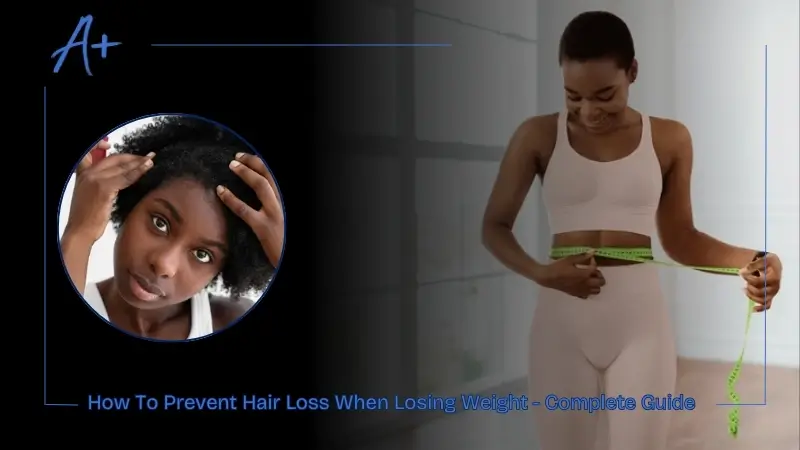
Weight loss offers numerous benefits, including increased energy, better health, and enhanced self-confidence. However, if you have observed hair strands on your pillow or in the shower while losing weight, you are not alone!
Many people experience unexpected hair loss during weight loss, particularly after sudden or drastic diets. This side effect can be alarming and puzzling.
This is where we address the big question; how to prevent hair loss when losing weight? In this blog, you will get the core reasons for this problem. You will also learn the best possible ways of stopping hair loss caused by weight loss with smart nutrition, lifestyle changes and targeted supplementation.
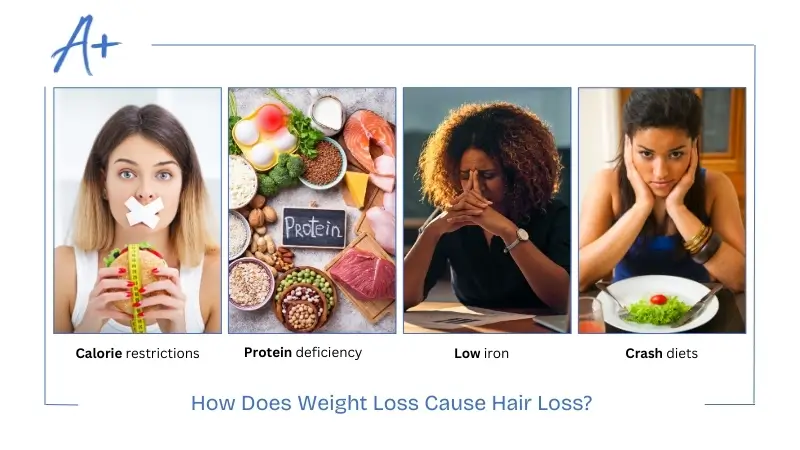
Hair growth requires a balance of hormones and a continuous supply of nutrients.
When you’re in a calorie deficit, especially during rapid weight loss, your body needs to conserve vital organs above hair follicles. This results in a condition called telogen effluvium, a form of temporary hair shedding caused by stress or starvation.
Can weight loss cause hair loss? Absolutely. Here’s how:
-
-
- Sudden calorie restrictions shock the body.
- Protein deficiency weakens hair shafts.
- Low iron or B12 reduces oxygen supply to follicles.
- Crash diets lead to hormonal imbalance.
- Unexplained weight loss and hair loss may signal underlying health issues.
-
Key Signs of Hair Loss From Weight Loss
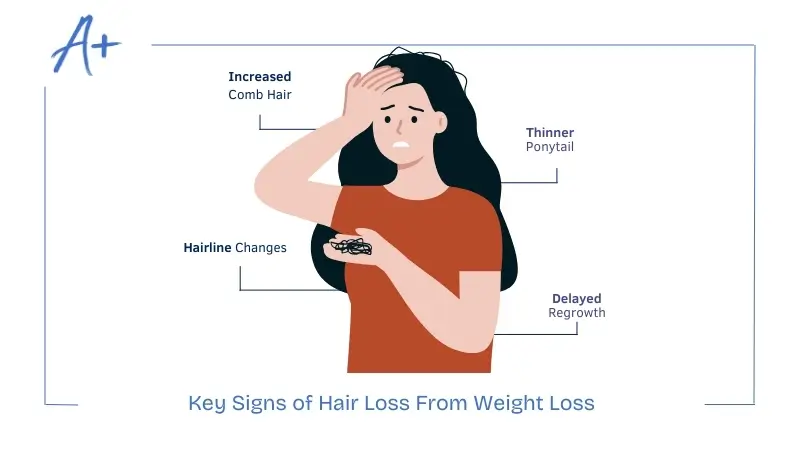
It’s crucial to differentiate natural shedding from stress-related loss. Watch for these signs:
| Signs | Description |
|---|---|
| Increased Comb Hair | More hair left behind during brushing |
| Thinner Ponytail | Noticeably reduced hair volume |
| Hairline Changes | Receding edges or scalp visibility |
| Delayed Regrowth | Hair isn't growing back within 3-6 months |
How To Avoid Hair Loss While Losing Weight?
Now let’s explore evidence-backed ways to prevent hair loss while achieving your weight goals.
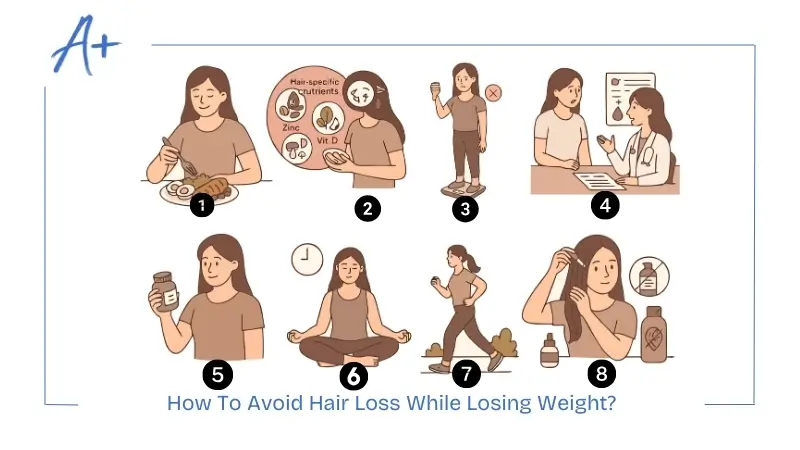
1 – Never Compromise On Protein Intake
Hair consists of keratin, a protein. A low-protein diet can cause hair to thin. To protect your hair:
-
-
- Aim for 0.8 to 1.2 grams of protein per kg of body weight.
- Prioritize lean sources like eggs, chicken, tofu, legumes, fish, and yogurt.
-
Note:- Hair loss and weight loss often go hand-in-hand due to poor protein intake.
2 – Hair-Specific Micronutrients
Here are the top vitamins to prevent hair loss during weight loss:
| Nutrient | Role in Hair Health | Best Sources |
|---|---|---|
| Biotin | Strengthens keratin structure | Eggs, nuts, seeds |
| Iron | Supports oxygen transport | Red meat, spinach, lentils |
| Zinc | Repairs hair tissue | Chickpeas, pumpkin seeds, beef |
| Vitamin D | Reduces shedding | Sunlight, fortified milk, mushrooms |
| Vit B12 | Prevents brittle hair | Fish, dairy, fortified cereals |
Note:- Female users especially need to monitor iron and B12 levels due to menstrual blood loss.
3 – Avoid Rapid Weight Loss Strategies
Sudden weight loss is one of the major culprits behind hair fall. Allow your body time to adjust:
-
-
- Aim to lose 1–2 pounds per week.
- Avoid crash diets, juice cleanses, and long fasting.
- Balance macronutrients to support hormonal health.
-
Remember, rapid weight loss often results in poor skin, fatigue, and hair loss.
4 – Check Your Thyroid & Hormonal Levels
Unexplained weight loss and hair loss together may signal:
-
-
- Hypothyroidism
- PCOS
- Iron-deficiency anemia
- Autoimmune disorders
- Early menopause
-
Get a full blood panel. Ask your doctor about TSH, Ferritin, Vitamin D, and CBC if you notice sudden changes. Weight loss and hair loss are signs of serious health issues—don’t ignore them.
5 – Smart Supplementation Strategy
Adding targeted supplements can help boost regrowth:
-
-
- Collagen peptides: Support scalp structure.
- Multivitamins: Fill nutritional gaps.
- Omega-3s: Reduce inflammation on scalp.
- Hair regrowth supplements with biotin and zinc.
-
Choose only certified brands. And yes, hair regrowth after weight loss is possible with consistent care.
6 – Manage Stress
Stress triggers cortisol spikes, which lead to hair fall. Tips to reduce stress:
-
-
- Get 7–9 hours of sleep.
- Practice yoga or breathing techniques.
- Limit caffeine and alcohol.
- Stay hydrated—aim for 2–3 liters of water daily.
-
Hair loss and weight loss often spike during highly stressful phases of dieting. Don’t ignore the mental aspect.
7 – Moderate Exercise
Moderate physical activity improves blood flow to the scalp. But, overtraining and extreme weight loss may backfire. Maintain balance:
-
-
- Exercise 3–5 days/week.
- Combine strength training with cardio.
- Avoid overexertion without adequate nutrition.
-
Can losing weight help hair growth? Yes—if done correctly, but only when paired with proper rest and nutrition.
8 – Hair Care During Weight Loss
Don’t let external damage worsen the issue. Be gentle.
-
-
- Avoid daily heat styling.
- Use sulfate-free, nourishing shampoos.
- Do weekly oil massages (coconut, castor oil).
- Detangle hair when damp using a wide-tooth comb.
-
Hair loss from weight loss worsens with poor hair care habits.
How Long Does Hair Loss From Weight Loss Last?
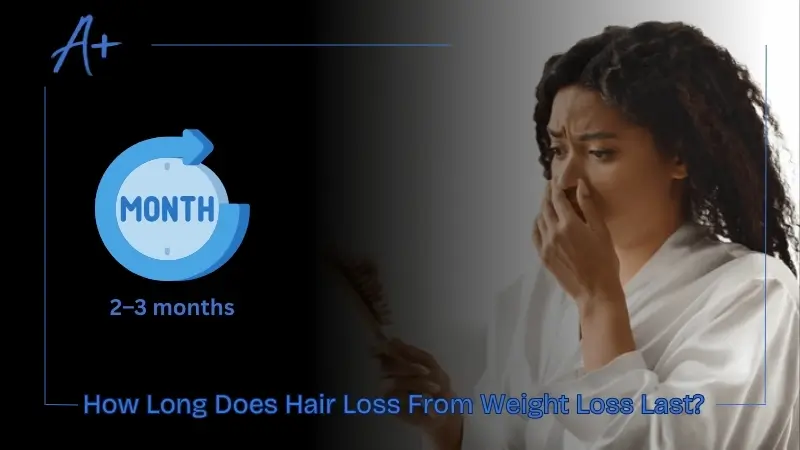
Hair loss from weight loss usually occurs 2–3 months following a major calorie deficit or a significant weight loss. This shedding phase is known as telogen effluvium and usually lasts six months or more.
But the good news?
-
-
- Once the body adjusts hair normally regrows naturally.
- With a balanced diet and the right vitamins to prevent hair loss during weight loss, full regrowth can be achieved in 6–12 months.
-
Frequently Asked Questions
Will hair loss from weight loss grow back?
Yes, in most cases it’s temporary. Hair regrowth begins within 3–6 months after nutritional rebalancing.
Can losing 50 pounds cause hair loss?
Yes, especially if it happens rapidly. A weight loss of over 10% body weight in under 3 months can cause telogen effluvium.
Does belly fat cause hair loss?
Indirectly, yes. A surplus of belly fat is associated with insulin resistance that may cause a hormonal imbalance that leads to hair thinning.
Which vitamin deficiency causes hair loss?
The most common culprits are Vitamin D, Iron, Biotin and Zinc deficiencies. All impact follicle strength and growth cycles.

